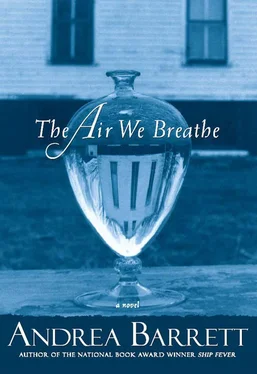The rest of us nodded, having many times admired through shop windows the gleaming parts bedded in sturdy wooden boxes. Those boxes, Ian continued, were exactly what he’d hoped to make; in Flushing he’d worked as a cabinetmaker and he had just the skills required. Several of us, longing to purchase the least expensive sets for our sons, wondered if Ian could get a discount and moved closer as Ian asked Naomi if he might have a few sheets of paper. He drew girders and angles and connecting strips, wheels and tiny motors, along with sketches of some of the models that boys from across the country submitted for the yearly contests. A windmill, a dredge that actually dug. A streetcar with wheels that moved.
For several more minutes we chattered, ignoring Miles’s attempts to interrupt us. At supper we wondered if our discussion had irritated him, but to our surprise an elaborate Erector set turned up in our library that weekend. The three of us who unpacked it and spread out the pieces were impressed to see an electric motor and extra gears.
“If we’d talked about books,” Frank said, “would he have sent up a crate of those?”
“Records?” asked Pietr, who loved opera.
“He wants something,” Abe said flatly. “He must. But what?”
“Why does he have to want something?” Pietr said, setting the lid of the box aside. “It’s a toy, and that’s all it is. But still — we’ve got enough parts to build almost anything.”
Together he and Frank and Abe made a simple building with a smoke-stack, rather like our power plant, which they left on the library table next to the open box. Soon after that the building disappeared, replaced by an arched bridge. Then a skyscraper rose and melted away, replaced first by a railroad car and then by an ambitious but inaccurate attempt at a battleship. Eudora stopped by the library after work one day and found Leo standing over that ship, which was now missing part of its deck. In his right hand he held a shiny hexagonal ring the size of a dinner plate.
“What did you make?” she asked.
“Model of a benzene molecule.” He hung the hexagon over her extended wrist. “Did you take chemistry in school?”
“Two years,” she said. “Not as much as I would have liked, but that’s all girls can take here. I remember benzene, though — six carbon atoms?”
“Kekulé’s structure,” he said. He’d built it almost unconsciously, his hands fitting the girders together into what for him was a common shape.
“Peculiar name,” Eudora said, turning the angular ring on her arm.
Leo pushed what was left of the ship across the table, remembering the scarred oak tables that had filled his old schoolroom, the smooth-bellied glass vessels and the sinuous tubing pulled fine as thread, the purring, nearly invisible flame of the Bunsen burner. Head-clearing tang of acetic acid, eggy stink of sulfur; he couldn’t think without pain of his dabbles into aromatic substitutions, pleasurably simple and yet so complex. During the few years of his studies in Odessa, the chemicals spritzing up from the bench had burned holes in his shirts. How hard he’d tried, during his first years in New York, to find work that made some use of his training! And how completely he had failed. One menial job after another, only the sugar refinery offering even a hint of possibility. Up here, where Miles’s descriptions of his cement gun and his fossil dinosaurs could seem equally interesting, or equally pointless, now that he knew he’d never be a chemist or find work he loved, he was doing his best to appreciate whatever came his way. Apparently his hands hadn’t resigned themselves, though.
“Where did you learn that?” Eudora said.
“In school,” he answered, wondering how long he’d been silent. “A while ago.” Briefly, and with more cheerfulness than he felt, he described his training in Odessa and his struggle, after emigrating, to find work.
“You ought to talk to Irene Piasecka,” she said. “The woman who runs the X-ray laboratory.”
“A woman took a radiograph of my chest,” he said. “Was that her?”
Eudora nodded. “She wasn’t raised around here either.”
The gleaming metal shape he’d made, which she now held in front of her like a dish, was perfectly useless but had at least drawn her attention. “Keep that, if you’d like,” he said.
IN THE BASEMENT, two floors beneath them, lay Irene’s domain: a long, dim, cool room, windowless and below the ground, smelling of ozone and the flagstone floor, the chemicals used in the darkroom and tarnishing silver. Dr. Petrie used to sit for hours at the end farthest from the X-ray apparatus, gazing at Irene’s face across the low table and, in the light of a single lamp, talking about his patients — us — and about the young men he’d once loved, both of whom had died. Ephraim, Leo, Pietr, Zalmen, Polly, Nan, Lydia, Abe — all of us had stood perfectly still, comforted by Irene’s voice, while she peered inside our chests. Sadie had talked obsessively to Irene about the dogs she bred, which she’d had to leave behind; Ladislav had talked about his childhood haunts, some of which Irene had also known; we liked the X-ray room, we felt at home. No point in describing how it is now.
On the day Leo gave Eudora the model, she headed down into the basement to visit Irene. Inside the door she dropped the hexagon onto her coat and then forgot about it. From Leo, as from Naomi and everyone else, she’d purposefully kept any suggestion of how much time she spent here. Evening after evening she approached Irene, who welcomed her if she wasn’t too busy. Over the last few months she’d learned what a Crookes tube was, how electrodes worked, and, although she’d never held a camera before, how to negotiate a darkroom and develop film. She’d helped Irene make pictures that once, she learned, had been called skiagraphs — images of shadows — but now were roentgenograms, or radiographs, a projection of something that blocked or absorbed the X-rays. Bones and teeth cast a strong shadow; organs and tissues left shadows lighter or darker depending on their densities. “In your imagination,” Irene had said, “you have to see the three-dimensional shape creating the one-dimensional shadow. That’s why it’s so hard to interpret the images correctly. Why they can be ambiguous.”
This made sense to Eudora, who was fascinated by the shadows of our organs. Inside the lungs of those she cleaned up after, bacilli were madly reproducing: what did the shadow of that invasion look like? In her high school biology class she’d seen bloodless drawings of human parts and also, in heavy old jars at the back of the room, preserved organs — brain, liver, and, yes, a small pair of dog’s lungs, still attached to bronchi and trachea — afloat in cloudy solutions. What she wanted to learn, though, was how lungs and heart, stomach and diaphragm, fit together within the cage of a person’s ribs. Before she started visiting Irene, her only hazy sense of this had come from the innards strewn about her father’s taxidermy shop.
There’d been times, as she was helping out her Aunt Elizabeth, when she’d wondered if she might like to train as a nurse. Since working at Tamarack State, and discovering both how comfortable she was around us and how little she was disturbed by the blood and mess of illness, she’d begun thinking about it more seriously. In the meantime she was grateful to Irene, who let her spy on our insides without judging her ignorance. Another person might have refused to teach her anything about X-rays because she knew so little physics or chemistry, declined to show her diseased lungs when she knew so little about healthy ones, been reluctant to let her develop an X-ray image before she’d handled a camera. But Irene, whose own path had been haphazard, didn’t seem to mind Eudora’s unsystematic approach.
Читать дальше












